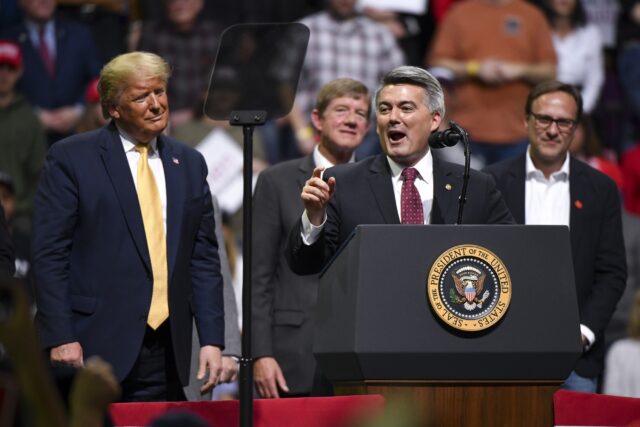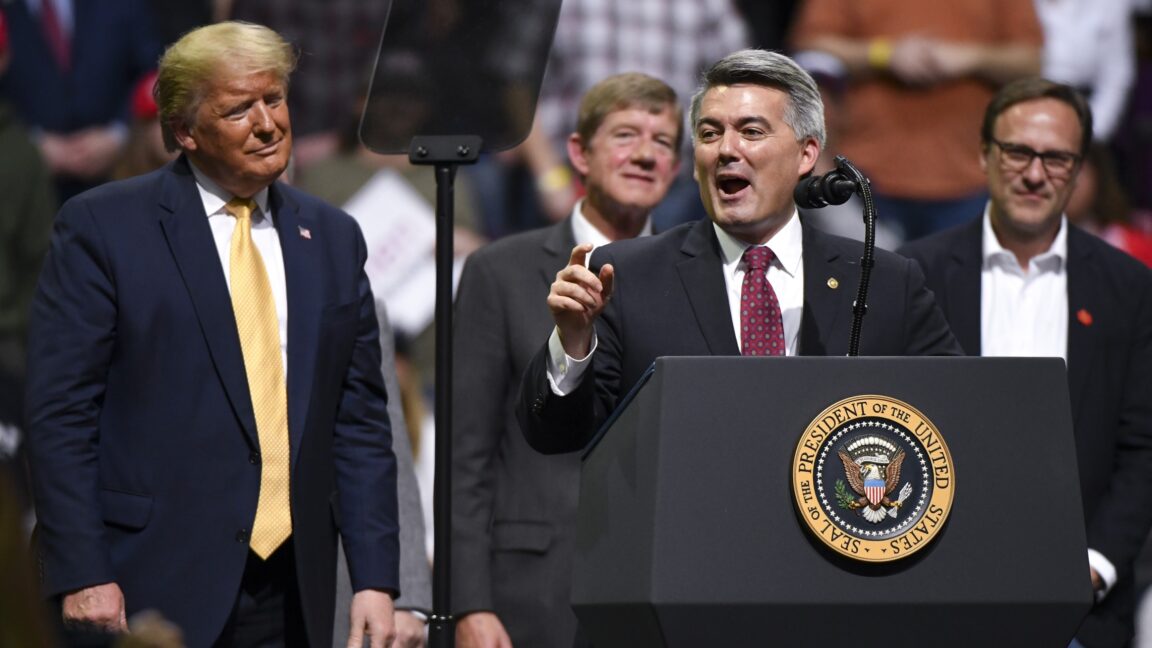- Регистрация
- 17 Февраль 2018
- Сообщения
- 38 930
- Лучшие ответы
- 0
- Реакции
- 0
- Баллы
- 2 093
Offline
Ex-senator Cory Gardner replaces ex-FCC Chairman Michael Powell as head of NCTA.


Then-Senator Cory Gardner (R-Colo.) speaks at a Keep America Great rally on February 20, 2020 in Colorado Springs, Colorado. Credit: Getty Images | Michael Ciaglo
The cable industry's top lobbying group has a new president and CEO. Cory Gardner, a Republican who spent 10 years in Congress, was announced today as the new head of NCTA-The Internet & Television Association.
Gardner represented Colorado in the US senate from 2015 to 2021 and was in the US House of Representatives from 2011 to 2015. He had to leave the Senate after losing a re-election bid and later became chairman of the Senate Leadership Fund, a super PAC devoted to "protecting and expanding the Republican Senate Majority."
Gardner will take over the NCTA's reins on September 22, replacing Michael Powell, who is retiring from the lobby group after nearly 15 years. Before becoming the cable industry's chief lobbyist, Powell was chairman of the Federal Communications Commission from 2001 to 2005. Powell led a Republican majority at the FCC.
The NCTA isn't the only telecom industry lobby group with a history of hiring former government officials. In April, wireless industry lobby group CTIA hired former FCC Chairman Ajit Pai as its president and CEO. Pai replaced Meredith Attwell Baker, a former Republican member of the FCC who led the CTIA from 2014 until this year.
Baker herself replaced Steve Largent, a former Republican member of Congress and NFL player who led the CTIA from 2003 to 2014. Another notable example of the revolving door is Democrat Tom Wheeler, who chaired the FCC during the Obama administration after having led both the NCTA and CTIA.
Rule-cutting and mergers on cable agenda
As the NCTA's new head, Gardner will be representing the interests of Comcast, Charter, and other cable companies. He can be expected to continue the group's long-term fight against government regulations applied to cable TV and broadband providers. He won't have much trouble convincing the current FCC chairman, Brendan Carr, who has embarked on a project to "delete" as many telecom regulations as possible.
The NCTA's announcement said that during Gardner's time in Congress, he "held committee assignments in both chambers that oversaw technology and telecommunications policy." NCTA Board Chair Mark Greatrex, who is also president of cable company Cox, said that Gardner's "bipartisan approach, strategic relationships, and deep understanding of the policy landscape will continue to strengthen NCTA's advocacy in Washington and support our commitment to delivering compelling services for consumers, businesses and communities."
The NCTA and CTIA sometimes have conflicting interests. As we've written, the wireless and cable industries are fighting each other over access to spectrum. A new US law allows the FCC to auction off spectrum currently allocated to Wi-Fi and the the Citizens Broadband Radio Service (CBRS), setting up a potential battle involving the industry lobbies and various advocacy groups.
Getting mergers approved is another regulatory priority for cable companies. Charter is seeking the government's permission to buy Cox for $34.5 billion in a merger that would make it the largest home Internet provider in the US, passing Comcast. (Disclosure: The Advance/Newhouse Partnership, which owns 12 percent of Charter, is part of Advance Publications, which owns Ars Technica parent Condé Nast.)


Then-Senator Cory Gardner (R-Colo.) speaks at a Keep America Great rally on February 20, 2020 in Colorado Springs, Colorado. Credit: Getty Images | Michael Ciaglo
The cable industry's top lobbying group has a new president and CEO. Cory Gardner, a Republican who spent 10 years in Congress, was announced today as the new head of NCTA-The Internet & Television Association.
Gardner represented Colorado in the US senate from 2015 to 2021 and was in the US House of Representatives from 2011 to 2015. He had to leave the Senate after losing a re-election bid and later became chairman of the Senate Leadership Fund, a super PAC devoted to "protecting and expanding the Republican Senate Majority."
Gardner will take over the NCTA's reins on September 22, replacing Michael Powell, who is retiring from the lobby group after nearly 15 years. Before becoming the cable industry's chief lobbyist, Powell was chairman of the Federal Communications Commission from 2001 to 2005. Powell led a Republican majority at the FCC.
The NCTA isn't the only telecom industry lobby group with a history of hiring former government officials. In April, wireless industry lobby group CTIA hired former FCC Chairman Ajit Pai as its president and CEO. Pai replaced Meredith Attwell Baker, a former Republican member of the FCC who led the CTIA from 2014 until this year.
Baker herself replaced Steve Largent, a former Republican member of Congress and NFL player who led the CTIA from 2003 to 2014. Another notable example of the revolving door is Democrat Tom Wheeler, who chaired the FCC during the Obama administration after having led both the NCTA and CTIA.
Rule-cutting and mergers on cable agenda
As the NCTA's new head, Gardner will be representing the interests of Comcast, Charter, and other cable companies. He can be expected to continue the group's long-term fight against government regulations applied to cable TV and broadband providers. He won't have much trouble convincing the current FCC chairman, Brendan Carr, who has embarked on a project to "delete" as many telecom regulations as possible.
The NCTA's announcement said that during Gardner's time in Congress, he "held committee assignments in both chambers that oversaw technology and telecommunications policy." NCTA Board Chair Mark Greatrex, who is also president of cable company Cox, said that Gardner's "bipartisan approach, strategic relationships, and deep understanding of the policy landscape will continue to strengthen NCTA's advocacy in Washington and support our commitment to delivering compelling services for consumers, businesses and communities."
The NCTA and CTIA sometimes have conflicting interests. As we've written, the wireless and cable industries are fighting each other over access to spectrum. A new US law allows the FCC to auction off spectrum currently allocated to Wi-Fi and the the Citizens Broadband Radio Service (CBRS), setting up a potential battle involving the industry lobbies and various advocacy groups.
Getting mergers approved is another regulatory priority for cable companies. Charter is seeking the government's permission to buy Cox for $34.5 billion in a merger that would make it the largest home Internet provider in the US, passing Comcast. (Disclosure: The Advance/Newhouse Partnership, which owns 12 percent of Charter, is part of Advance Publications, which owns Ars Technica parent Condé Nast.)
